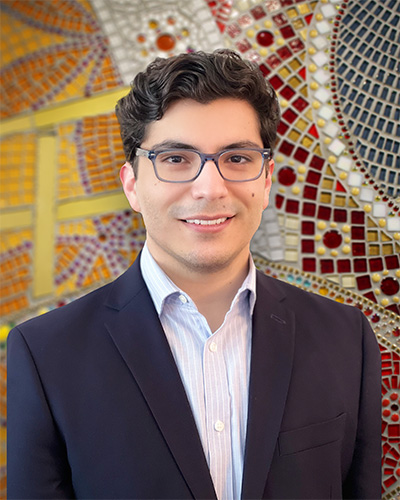GCSW Doctoral Student Named IMFP Fellow
(Houston, TX) Doctoral student Alberto Cabrera has been selected as a fellow for the American Psychological Association's Interdisciplinary Minority Fellowship Program (IMFP).
This fellowship “supports the training of ethnic minority graduate students who commit to significantly improving the quality of care provided to ethnic and racial minorities who have a mental or cooccurring mental and substance use disorder.”
Cabrera’s research within the Latinx community focuses on advocacy, improving access to mental health services, and empirically supported treatment of obsessive compulsive disorder (OCD).
We spoke with Cabrera about what this fellowship opportunity means to his chosen career path.
---

Name: Alberto Cabrera
Pronouns: he/him/his
Program: Ph.D. Cohort 2019
To start off, congratulations again on being awarded the American Psychological Association's Interdisciplinary Minority Fellowship Program (IMFP)! What does receiving this mean to you?
Being awarded this fellowship is both humbling and a tremendous honor, and I’m grateful to the APA’s IMFP decision committee and the incredible mentors I’ve had along my academic journey, especially Dr. Gearing, whose guidance has been essential throughout my time in the Ph.D. program. This fellowship means so much to me for a variety of reasons including the opportunity to highlight mental health disparities that I research and study and the inclusion and recognition of social workers by long-standing institutions such as the APA. Licensed social workers provide more than 60% of all mental health services in the country, and it’s a privilege to represent that group.
What does this fellowship entail?
Funded through the Substance Abuse and Mental Health Services Administration (SAMSHA), the fellowship's primary purpose is to address mental health disparities among ethnic minority groups by filling the need for more graduate-level mental health providers with a BIPOC identity. A few students nationwide are selected every year and offered the fellowship’s networking, mentoring, and training opportunities.
What do you hope to gain by the end of this experience?
Collaborating with like-minded individuals who share a passion for progress and equity, particularly in addressing the mental and behavioral health needs of our country's most marginalized communities. This experience will enhance my research skills and give me the expertise to engage audiences through scholarly work. Ultimately, my goal is to improve individuals' access to mental health services in all communities.
Tell us a little about yourself, what led you to be a social worker? What would you say is your passion and what inspires you?
Drawn to the unique values of social work, my passion is to help individuals navigate their mental health struggles and surpass their perceived limits. My years as a licensed clinical social worker and healthcare administrator have shown me the inspiring resilience of people, reinforcing the importance of service and social justice. This has strengthened my commitment to facilitating transformative differences in the mental health sphere.
Talk to us about your work, “Addressing Inequities in Mental Health Care for Latinos living with Obsessive-Compulsive Disorder (OCD) in the U.S.”
Obsessive-Compulsive Disorder (OCD) is a chronic and severe mental health disorder that is both widespread and deeply misunderstood. Instead of recognizing it as a serious condition, it is often dismissed as an eccentricity or a personality quirk. Globally, it affects a staggering number of people - an estimated 240 million - and is among the top ten reasons for filing disability claims worldwide. The path to accurate diagnosis is fraught with challenges; individuals with OCD are often underdiagnosed or misdiagnosed. It can take more than ten years on average for someone to receive an accurate diagnosis, and even longer to connect them with the appropriate treatment. The recommended treatment, known as Exposure and Response Prevention (ERP), requires specific training, which is lacking among many mental health providers. These issues are further exacerbated in Latino communities were additional obstacles present themselves as barriers to adequate care. My objective is to educate people on what OCD truly is, the appropriate treatment, and research ways in which to assist people in gaining access to and remaining in treatment.
What do you hope to accomplish once you graduate?
An overarching goal of mine is that all individuals who live with OCD, including those in underserved communities, have access to effective evidenced based treatment provided by culturally aware providers. I intend to engage in both research and clinical work actively. My experiences as a therapist have greatly influenced my identity and understanding of mental health issues as societal challenges. I aspire to continue this work while also making meaningful contributions to the existing body of knowledge in the field.
Anything else you would like to share?
Just a brief message for MSW and Ph.D. students pursuing degrees in social work or graduate students working towards degrees in any helping profession: keep going and don’t give up! There’s a need for people who believe every life is significant. If we can understand and feel for our fellow person, we can learn to overcome our differences and help one another. Empathy is the ultimate equalizer.